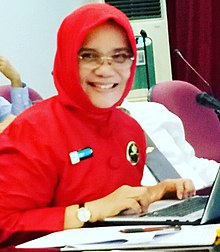Educational
development aims to produce highly intelligent Indonesians by providing
affordable, available, quality, relevant and equal educational services.
In practice, however, training methods and skills vary greatly,
including between ministries and on issues such as industry standards,
which can impact employment.
This
concern was emphasised by the Director of Courses and Training in
Non-Formal and Informal Early Childhood Education (PAUDNI) at the
Ministry of Education and Culture (Kemendikbud) Muslich SH., during the
International Experiences Workshop on Resource Mobilisation for Skills
Enhancement.
"These differences give rise to new discourse: whether we need an agency or institution to act as a facilitator for ministries involved with training and skills policies," he said during a presentation.
TNP2K’s Executive Secretary Bambang Widianto said, "Indonesia needs to boost its economic growth to generate jobs. Countries are facing challenges, such as the need to create employment, raise productivity and promote small and medium enterprises. This will not only create value-added work but also build good industrial relations so that both employers and employees can agree on issues such as minimum wage, severance pay and outsourcing systems that are satisfactory to all parties. Development skills are essential for improving productivity. In this workshop we want to hear and learn about efforts in other countries to develop skills," he said in a speech at the workshop.
Meanwhile, the Secretary General of the Ministry of Manpower and Transmigration, Ir. Abdul Wahab Bangkona, M.Sc, reiterated the point that different methods are being used between ministers, as well as within institutions themselves.
The workshop was facilitated by four institutions: National Team for Accelerating Poverty Reduction (TNP2K), Australian Aid, World Bank and the National Development Planning Agency (BAPPENAS). It was held on 12 March 2014 at the Borobudur Hotel in Jakarta to discuss international experiences in mobilising resources for skills improvement. The discussions also involved the sharing of implementation experiences in Australia, South Korea and Chile.
Among the experiences highlighted from Australia was that training was actively conducted to maximise necessary industry labour skills and to boost the commitment of apprentices to achieve the greatest results.
Speakers at the workshop: Muslich, SH; psychologist Prof. Dr. Lydia Freyani Hawadi; Secretary General of the Ministry of Manpower and Transmigration (Kemnakertrans), Ir. Wahab Abdulah Bangkona, M.Sc; Director of Labour and Employment Expansion, Dra. Rahma Iryanti, BAPPENAS; Nina Tursina Indonesian Employers Association (APINDO); and Sumarna from the Chamber of Commerce and Industry (Kadin). In addition, several overseas speakers were invited, including Cristobal Ridao-Cano (Education Economist) at the World Bank; Ignacio Canales and Bonny Banks (Chile); Sung Joon Paik (South Korea); and Bernard Moore (Australia).
Sumber: http://www.tnp2k.go.id/en/artikel/international-experiences-workshop-on-skills-enhancement/
"These differences give rise to new discourse: whether we need an agency or institution to act as a facilitator for ministries involved with training and skills policies," he said during a presentation.
TNP2K’s Executive Secretary Bambang Widianto said, "Indonesia needs to boost its economic growth to generate jobs. Countries are facing challenges, such as the need to create employment, raise productivity and promote small and medium enterprises. This will not only create value-added work but also build good industrial relations so that both employers and employees can agree on issues such as minimum wage, severance pay and outsourcing systems that are satisfactory to all parties. Development skills are essential for improving productivity. In this workshop we want to hear and learn about efforts in other countries to develop skills," he said in a speech at the workshop.
Meanwhile, the Secretary General of the Ministry of Manpower and Transmigration, Ir. Abdul Wahab Bangkona, M.Sc, reiterated the point that different methods are being used between ministers, as well as within institutions themselves.
The workshop was facilitated by four institutions: National Team for Accelerating Poverty Reduction (TNP2K), Australian Aid, World Bank and the National Development Planning Agency (BAPPENAS). It was held on 12 March 2014 at the Borobudur Hotel in Jakarta to discuss international experiences in mobilising resources for skills improvement. The discussions also involved the sharing of implementation experiences in Australia, South Korea and Chile.
Among the experiences highlighted from Australia was that training was actively conducted to maximise necessary industry labour skills and to boost the commitment of apprentices to achieve the greatest results.
Speakers at the workshop: Muslich, SH; psychologist Prof. Dr. Lydia Freyani Hawadi; Secretary General of the Ministry of Manpower and Transmigration (Kemnakertrans), Ir. Wahab Abdulah Bangkona, M.Sc; Director of Labour and Employment Expansion, Dra. Rahma Iryanti, BAPPENAS; Nina Tursina Indonesian Employers Association (APINDO); and Sumarna from the Chamber of Commerce and Industry (Kadin). In addition, several overseas speakers were invited, including Cristobal Ridao-Cano (Education Economist) at the World Bank; Ignacio Canales and Bonny Banks (Chile); Sung Joon Paik (South Korea); and Bernard Moore (Australia).
Sumber: http://www.tnp2k.go.id/en/artikel/international-experiences-workshop-on-skills-enhancement/







0 komentar:
Posting Komentar